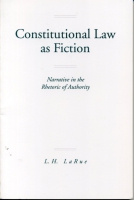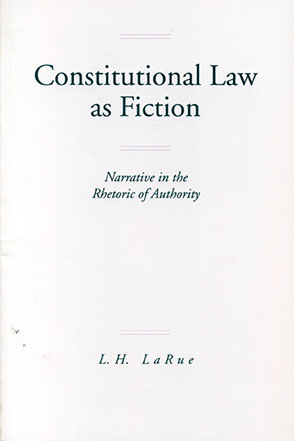Constitutional Law as Fiction
Narrative in the Rhetoric of Authority
Lewis H. LaRue
“LaRue is interested not in the simple claim that meaning is constructed, but in demonstrating the particular ways in which judicial writers create meaning in particular cases, and how in doing so they succeed, or fail, in creating the grounds of their own authority. . . . LaRue opens up a new set of questions and concerns, which should be of great value to lawyers, judges, and others interested in constitutional law, or law more generally.”
- Description
- Reviews
- Bio
- Subjects
Like a history, this story has the appearance of simple truth, but, in fact, of necessity, it is a "fiction" as well—not in the sense of a lie or fairy tale, but in the sense of a constructed meaning. Strangely enough, these fictions persuade those who read them and those who write them, and without this persuasion, the law would lose much of its authority. L. H. LaRue examines several critical Supreme Court cases, including Everson v. Board of Education and Marbury v. Madison, and specifically examines the rhetorical techniques of Chief Justice John Marshall.
In analyzing the construction of meaning in the rhetoric of the law, LaRue ultimately contends that judges must not abandon the "fictions" in their judgments; they must strive to improve them.
“LaRue is interested not in the simple claim that meaning is constructed, but in demonstrating the particular ways in which judicial writers create meaning in particular cases, and how in doing so they succeed, or fail, in creating the grounds of their own authority. . . . LaRue opens up a new set of questions and concerns, which should be of great value to lawyers, judges, and others interested in constitutional law, or law more generally.”
“Perhaps the strongest praise I can give this manuscript is that, having read it once, I actually look forward to reading it again, not because it is ‘difficult’ in any ordinary sense, but because it is an unusually rich book.”
L. H. LaRue is Class of 1958 Alumni Professor of Law, Washington and Lee University. He is the author of A Student's Guide to the Study of Law: An Introduction (1987) and Political Discourse: A Case Study of the Watergate Affair (1988) and co-editor (with Wythe Holt) of Rewriting the History of the Judiciary Act of 1787 by Wilfred J. Ritz (1990).
Mailing List
Subscribe to our mailing list and be notified about new titles, journals and catalogs.




